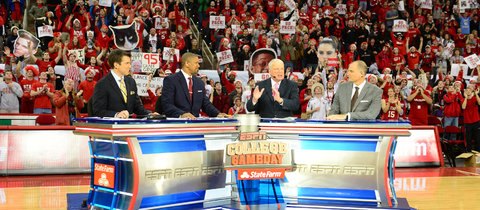 Phil Ellsworth/ESPN Images ESPN’s “College GameDay” in Raleigh, N.C. Increasing costs at ESPN hurt Disney’s earnings.
Phil Ellsworth/ESPN Images ESPN’s “College GameDay” in Raleigh, N.C. Increasing costs at ESPN hurt Disney’s earnings.
LOS ANGELES — Higher costs at ESPN and lower DVD sales resulted in a 6 percent decline in quarterly profit at Disney, the company said late Tuesday. But Disney’s video game and Web unit finally swung to a profit and the conglomerate steered attention toward potential “Star Wars” growth.
Wall Street reacted positively; Disney shares climbed 3 percent in after-hours trading, to about $56.
Robert A. Iger, chairman and chief executive of the Walt Disney Company, told analysts in a conference call that Disney’s newly acquired Lucasfilm division is moving forward with “a few” additional movies that feature characters from the “Star Wars” universe.
Lawrence Kasdan, known for his work on “The Empire Strikes Back” and “Return of the Jedi,” and Simon Kinberg, a screenwriter whose credits include “Sherlock Holmes,” are both working on the “stand-alone” films, Mr. Iger said. Disney has previously announced plans to make the seventh, eighth and ninth installments in the “Star Wars” saga; they will roll out over a six-year period starting in 2015 with one directed by J.J. Abrams.
Investors and analysts had been expecting a bumpy quarter. Disney made the unusual decision in November to note publicly some of its coming difficulties, like higher ESPN programming costs and a calendar quirk that would hurt theme parks by moving part of the New Year’s holiday into a different quarter.
Even so, Disney beat Wall Street estimates of 76 cents a share. For the quarter, which ended on Dec. 29, Disney reported net income of $1.38 billion, or 77 cents a share, down from $1.46 billion, or 80 cents a share, in the same quarter a year earlier. Excluding one-time charges and gains, Disney reported 79 cents a share for the most recent quarter, the first in the company’s fiscal year.
Revenue climbed 5 percent, to $11.34 billion.
ESPN had a significant impact on Disney’s quarter, with programming expenses increasing for football and basketball. Those costs held back results for Disney’s media networks unit, which houses the cable sports behemoth; operating income there increased a tepid 2 percent, to $1.21 billion. The growth came from the Disney Channel, ABC Family and higher ad sales at the ABC broadcast network.
Also dragging down quarterly results was Walt Disney Studios, which reported a 43 percent drop in operating income, to $234 million. The problem involved comparability: DVD sales for “Brave” and “Cinderella” were slight compared with disc releases in the same period a year earlier for “Cars 2” and “The Lion King.”
Theme parks continued to be a bright spot. Operating income in Disney’s parks and resorts division, watched as a barometer of the broader economy, increased 4 percent in the most recent quarter, to $577 million. Higher attendance at Disneyland Resort in California, where a “Cars”-themed area opened last summer, contributed to the growth, as did strong bookings on the company’s Fantasy cruise ship.
Interactive media, a business unit that includes video games and Disney.com, turned to an operating profit of $9 million after 16 consecutive quarters of losses. The company cited growth from Disney-branded cellphones in Japan as part of the reason. But Mr. Iger told analysts that there would most likely be losses ahead. “We know we have more work to do,” he said.
Article source: http://mediadecoder.blogs.nytimes.com/2013/02/05/costs-at-espn-depress-disney-profits/?partner=rss&emc=rss
